Page Content
Library offerings cover everything from finances to emotional well-being
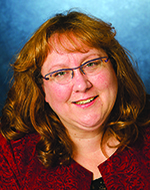 You may be surprised to learn that your ATA library carries materials focused not only on teaching, but also on different aspects of teachers’ lives. As this issue of the ATA Magazine focuses on retirement, we are happy to highlight some of our retirement-related resources for you. We would like to thank the Alberta Retired Teachers’ Association wellness committee for its generous donation of many of these materials to our library.
You may be surprised to learn that your ATA library carries materials focused not only on teaching, but also on different aspects of teachers’ lives. As this issue of the ATA Magazine focuses on retirement, we are happy to highlight some of our retirement-related resources for you. We would like to thank the Alberta Retired Teachers’ Association wellness committee for its generous donation of many of these materials to our library.
Both current members and life members of the Alberta Teachers’ Association can borrow materials from our library. The library pays for shipping both ways, so there is never any cost for using our collection. To borrow materials, you need to create an account through the login link on our library website (http://library.teachers.ab.ca) and then let us know what titles you would like to borrow. We do our best to mail materials out to you on the day you request them. Please contact us at 1-800-232-7208 or library@ata.ab.ca if you have questions or need support in creating your library account.
BOOKS
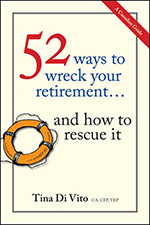 52 Ways to Wreck Your Retirement… and How to Rescue It
52 Ways to Wreck Your Retirement… and How to Rescue It
Di Vito, T. 2011. John Wiley & Sons Canada: Toronto, ON (332.024 D536)
In this frighteningly titled book, author Tina Di Vito explores the common mistakes made in retirement planning and discusses how readers can correct poor choices they may have already made.
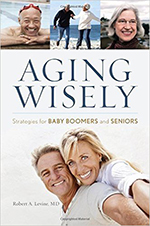 Aging Wisely: Strategies for Baby Boomers and Seniors
Aging Wisely: Strategies for Baby Boomers and Seniors
Levine, R. A. 2014. Rowman & Littlefield: Lanham, CO (613.0438 L665)
Author Robert Levine believes that maintaining a good attitude is a key element to aging well. He discusses taking active control when dealing with adversity and speaks to strategies for maintaining quality of life throughout the aging process.
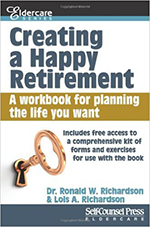 Creating a Happy Retirement: A Workbook for Planning the Life You Want
Creating a Happy Retirement: A Workbook for Planning the Life You Want
Richardson, R.W. and L. A. Richardson. 2013. Self Counsel Press: North Vancouver, BC (646.79 R524)
Breaking with tradition of retirement books focusing on financial planning, this workbook focuses on life-planning for the years after retirement.
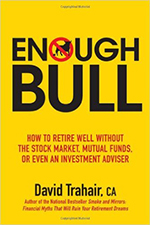 Enough Bull: How to Retire Well without the Stock Market, Mutual Funds, or Even an Investment Advisor
Enough Bull: How to Retire Well without the Stock Market, Mutual Funds, or Even an Investment Advisor
Trahair, D. 2009. John Wiley & Sons Canada: Toronto, ON (332.024 T765)
The message from Canada’s major banks is that we all need to maximize our RSP contributions or we will face destitution in our retirement years. Tired of the fearmongering, chartered accountant David Trahair has written a book that provides unconventional wisdom for those who are thinking about retirement.
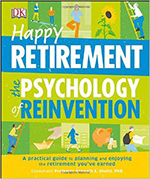 Happy Retirement: The Psychology of Reinvention
Happy Retirement: The Psychology of Reinvention
Shultz, K. 2015. DK: New York, NY (646.79 S562)
A fully illustrated guide that uses the latest psychological research to explore strategies for successfully transitioning into retirement.
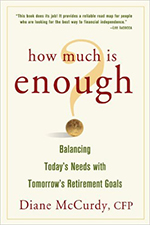 How Much is Enough? Balancing Today’s Needs with Tomorrow’s Retirement Goals
How Much is Enough? Balancing Today’s Needs with Tomorrow’s Retirement Goals
McCurdy, D. 2013. John Wiley & Sons Canada: Toronto, ON (332.024 M111)
The biggest question for most people when thinking about retirement is “how much is enough?” Diane McCurdy provides practical answers for people at any stage of their career so that they can make realistic decisions based on their financial realities.
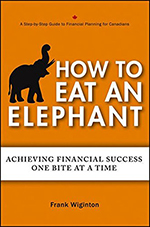 How to Eat an Elephant: Achieving Financial Success One Bite at a Time
How to Eat an Elephant: Achieving Financial Success One Bite at a Time
Wiginton, F. 2013. John Wiley & Sons Canada: Toronto, ON (332.024 W654)
Ever feel overwhelmed when thinking about personal finances? Knowing that most of us do, Frank Wiginton offers a four-hour per month plan to help readers get their financial affairs in order, reduce stress about money and save money in advisory and management fees.
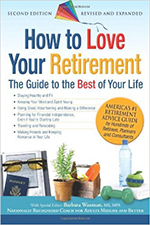 How to Love Your Retirement: The Guide to the Best of Your Life
How to Love Your Retirement: The Guide to the Best of Your Life
Waxman, B, ed. 2010. Hundreds of Heads Books, LLC: Atlanta, GA (646.7 W356)
Going beyond mere financial planning for retirement, this book also offers information about psychological and physical health, social planning and home selection to help readers develop a broader plan for retirement.
In Our Prime: The Fascinating History and Promising Future of Middle Age
Cohen, P. 2012. Scribner: New York, NY (305.244 C678)
Tracing how middle age has been depicted over time, Patricia Cohen illustrates how depictions have shaped and altered our understanding and experience of this time in our lives.
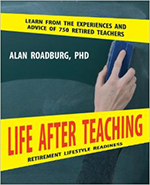 Life after Teaching: How to Ensure That Your Retirement Will Be Worthwhile and Enjoyable
Life after Teaching: How to Ensure That Your Retirement Will Be Worthwhile and Enjoyable
Roadburg, A. 2008. Life After Work Press: Thornhill, ON (646.79 R628)
Based on interviews with 450 retired teachers, this book offers lived experience and advice to all teachers about achieving a happy retirement.
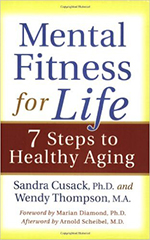 Mental Fitness for Life: 7 Steps to Healthy Aging
Mental Fitness for Life: 7 Steps to Healthy Aging
Cusack, S. and W. Thompson. 2003. Key Porter Books Ltd: Toronto, ON (158.1 C984)
The authors suggest following six practices to support mental health as we age: goal setting, power thinking, creativity, positive mental attitude, memory and learning, and speaking your mind. They state that using these practices will lead to the seventh step, which is being mentally fit for life.
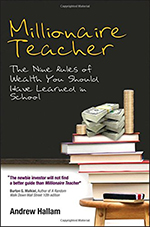 Millionaire Teacher: The Nine Rules of Wealth You Should Have Learned in School
Millionaire Teacher: The Nine Rules of Wealth You Should Have Learned in School
Hallam, A. 2011. John Wiley & Sons Canada: Toronto, ON (332.6 A562)
As a former teacher, author Andrew Hallam is interested in the education gap that happens around personal finance in schools and has written this book as a tool to help people learn the basics of investing wisely.
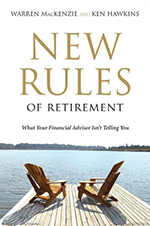 New Rules of Retirement: What Your Financial Advisor Isn’t Telling You
New Rules of Retirement: What Your Financial Advisor Isn’t Telling You
MacKenzie, W. and K. Hawkins. 2008. Collins: Toronto, ON (332.024 M157)
There are many myths about retirement planning and many of these are perpetuated by the financial planning industry. The authors provide advice to readers that will help them understand the information they receive from a financial planner and present a series of useful rules to make the best financial choices.
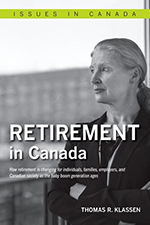 Retirement in Canada: How Retirement Is Changing for Individuals, Families, Employers, and Canadian Society as the Baby Boom Generation Ages
Retirement in Canada: How Retirement Is Changing for Individuals, Families, Employers, and Canadian Society as the Baby Boom Generation Ages
Klassen, T. A. 2013. Oxford University Press: Oxford, UK (306.3 K63)
Exploring how retirement is changing as we live longer and healthier lives, Thomas Klassen discusses shifting attitudes, demographics and issues like mandatory retirement in Canada.
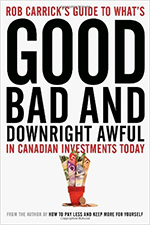 Rob Carrick’s Guide to What’s Good, Bad, and Downright Awful in Canadian Investments Today
Rob Carrick’s Guide to What’s Good, Bad, and Downright Awful in Canadian Investments Today
Carrick, R. 2010. Doubleday Canada: Toronto, ON (332.6 C311)
This useful guide to investing in Canada is written in a direct, no-nonsense style that provides clear advice in understanding how investments work, what the risks are, and how to choose the best options for you.
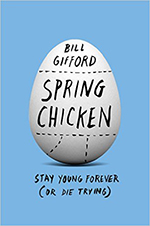 Spring Chicken: Stay Young Forever (Or Die Trying)
Spring Chicken: Stay Young Forever (Or Die Trying)
Gifford, B. 2015. Grand Central Publishing: New York, NY (613.2 G458)
How can we live longer and better? This is the central question that occupies Bill Gifford in this book about the science of aging. He discusses hoaxes and scams, as well as the best new science of slowing the aging process and offers practical advice for how to implement changes to improve one’s health and fitness in retirement.
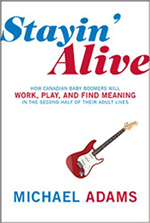 Stayin’ Alive: How Canadian Baby Boomers Will Work, Play, and Find Meaning in the Second Half of Their Lives
Stayin’ Alive: How Canadian Baby Boomers Will Work, Play, and Find Meaning in the Second Half of Their Lives
Adams, M. 2010. Viking Canada: Toronto, ON (305.244 A215)
Author Michael Adams discusses the four tribes within the baby boom generation and explores the unique approaches to life and retirement these groups are taking in their later years.
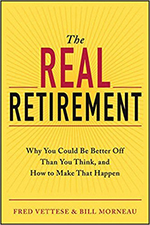 The Real Retirement: Why You Could Be Better Off than You Think You Are
The Real Retirement: Why You Could Be Better Off than You Think You Are
Vettese, F. and B. Morneau. 2013. John Wiley & Sons Canada: Toronto, ON (332.024 V591)
Disagreeing with the fearmongering of major banks about retirement planning, the authors discuss how to plan and achieve a comfortable retirement without ransacking your present.
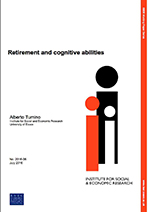 Retirement and Cognitive Abilities
Retirement and Cognitive Abilities
Tumino, A. 2016. Institute for Social and Economic Research: London, UK (646.79 T925)
Alberto Tumino has studied how retirement negatively impacts the cognitive abilities of older citizens and notes that extending working life has a beneficial effect on cognitive functions. He recommends that retirees live a mentally engaging and stimulating lifestyle during retirement to extend their cognitive health.
Stress Management and Longevity: The Importance of Physical and Social Activity in Later Life
McConatha, J. T. 2014. Meyer & Meyer Sport: Toronto, ON (613.0434 M121)
Jasmin Tahmaseb-McConatha describes the relationship between longevity, aging and stress and offers effective coping techniques such as exercise and social engagement that reduce stress and positively impact aging.
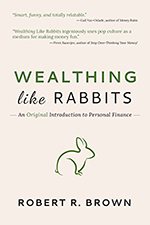 Wealthing Like Rabbits: An Original Introduction to Personal Finance
Wealthing Like Rabbits: An Original Introduction to Personal Finance
Brown, R. R. 2014. Redford Enterprises: Ajax, ON (332.024 B897)
A humorous and entertaining introduction to the mysteries of personal finance, this book uses pop culture references to gently guide readers to a better understanding of how to manage finances and reach their financial goals.
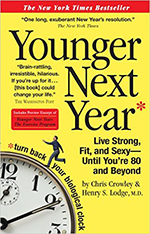 Younger Next Year: Live Strong, Fit, and Sexy Until You’re 80 and Beyond
Younger Next Year: Live Strong, Fit, and Sexy Until You’re 80 and Beyond
Crowley, C. and H. S. Lodge. 2007. Workman Publishing: New York, NY (613.04234 953)
In this highly motivating book, the authors demonstrate that a fitness program begun at any age can greatly improve your health and well-being throughout retirement.
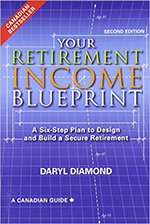 Your Retirement Income Blueprint: A Six-Step Plan to Design and Build a Secure Retirement
Your Retirement Income Blueprint: A Six-Step Plan to Design and Build a Secure Retirement
Diamond, D. 2014. Milner & Associates, Inc: Hamilton, ON (332.024 D537)
This book covers tax planning, consolidation of retirement income sources and estate planning for those considering retiring or who have retired in the last few years.
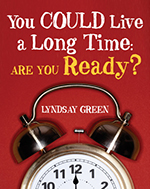 You Could Live a Long Time: Are You Ready?
You Could Live a Long Time: Are You Ready?
Green, L. 2010. Thomas Allen Publishers: Markham, ON (155.67 G796)
What are you going to do in retirement? Lyndsay Green focuses on the social aspects of retirement and asks questions to stimulate people into thinking about how they will fill their time and find happiness away from work.
FRENCH BOOKS/LIVRES EN FRANÇAIS
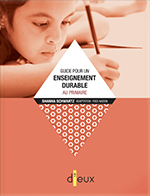 Guide pour un enseignement durable au primaire
Guide pour un enseignement durable au primaire
Schwartz, Shanna. Adaptation : Yves Nadon. 2016. Sherbrooke, QC : D’eux (372.1102 S399)
L’auteure, qui a enseigné l’atelier d’écriture dans des milliers de classes, élabore ici quatre principes qui assurent que notre enseignement adhère aux élèves : 1. Les enfants apprennent ce qu’ils sont prêts à apprendre; 2. Les enfants apprennent quand ils s’engagent dans leur apprentissage; 3. Les enfants tirent profit des représentations matérielles de leur apprentissage; 4. Les élèves apprennent par - et adorent - la répétition. Cet ouvrage propose de nombreux exemples pratiques.
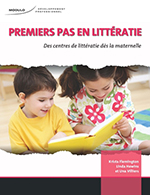 Premiers pas en littératie : Des centres de littératie dès la maternelle
Premiers pas en littératie : Des centres de littératie dès la maternelle
Flemington, Krista, Linda Hewins et Una Villiers. Adaptation : Johanne Proulx. 2012. Montréal, QC : Modulo (372.6 F598)
Cet ouvrage propose aux enseignants de la maternelle des stratégies éprouvées pour créer des classes stimulantes où les enfants participent activement à leur apprentissage. Les stratégies d’apprentissage individualisées reposent sur le jeu et les premières expériences de littératie vécues à la maison ou à la garderie. Ce livre encourage les enseignants à observer, à réagir et à miser sur les préférences des enfants lors d’entretiens individuels, d’activités en petits groupes ou de rassemblements.
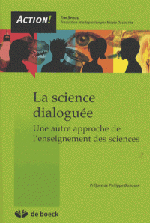 La science dialoguée : Une autre approche de l’enseignement des sciences
La science dialoguée : Une autre approche de l’enseignement des sciences
Sprod, Tim. Traduction et adaptation : Nicole Decostre. 2013. Bruxelles, BEL : De Boeck. (507.1094 S771)
L’ouvrage propose 18 histoires, ancrées dans la vie quotidienne, servant de base à l’établissement d’un dialogue de qualité entre le professeur et les élèves, d’une part, et entre les élèves d’autre part. Faire sortir la science de son « carcan » purement éducatif et la placer au sein d’une réflexion communautaire, tel est l’objectif de ce livre. Voilà donc un outil pédagogique d’emploi diversifiable et souple susceptible d’attirer les jeunes intelligences vers l’étude scientifique - parfois jugée rébarbative - alors qu’elle est devenue un axe majeur de notre civilisation, de notre vie quotidienne et donc de notre avenir.
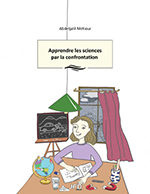 Apprendre les sciences par la confrontation : Force et mouvement, chaleur et température, transformations physiques de la matière, lumière, circuit électrique
Apprendre les sciences par la confrontation : Force et mouvement, chaleur et température, transformations physiques de la matière, lumière, circuit électrique
Métioui, Abdeljalil. 2016. Montréal, QC. Éditions JFD : (500 M587)
Cet ouvrage est consacré aux défis scientifiques que posent certaines questions reliées aux phénomènes naturels et construits, à ceux qui œuvrent dans le domaine de l’éducation scientifique de base et qui ne sont pas des spécialistes. L’objectif est de les amener à confronter leurs conceptions sur plusieurs questions avec lesquelles on est quotidiennement en interaction, de façon explicite ou implicite en vue d’acquérir le langage scientifique. Le lecteur est invité à remplir un questionnaire à choix multiples, à analyser différentes réponses à une même question, puis à comparer ses réponses et ses analyses avec celles données dans la deuxième partie de l’ouvrage. Finalement, une synthèse des notions couvertes lui est présentée.
